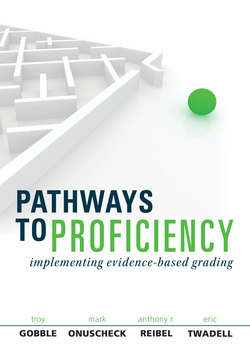Читать книгу Pathways to Proficiency - Eric Twadell - Страница 6
На сайте Литреса книга снята с продажи.
ОглавлениеTable of Contents
About the Authors
Introduction
The Case for Evidence-Based Grading
A New Language: Evidence-Based Grading
Curriculum Focuses on Proficiency-Based, Student-Friendly Learning Targets
Instruction Focuses on Teacher and Student Reactions to Student-Produced Evidence
Assessment Gives Students Opportunities for Reflection and Feedback
Teachers Determine Grades With a Calibrated Interpretation of Student Evidence
Five Phases of Implementing Evidence-Based Grading
The Structure of This Book
Chapter 1
Preparation
Our Team’s Story
The Four Commitments in Evidence-Based Grading
Agree That the Percentage System Is a Flawed Grading Model
Eliminate Four Specific Grading Errors
Focus on Grading Proficiency
Use Student-Produced Evidence
Key Points
Chapter 2
Incubation
Our Team’s Story
The Four Unexpected Relationships in Evidence-Based Grading
Proficiency-Based Learning Targets Connect With Grading
Feedback Connects With Instruction
Assessment Connects With Grading
The Gradebook Connects With Learning
Key Points
Chapter 3
Insight
Our Team’s Story
The Five Insights in Evidence-Based Grading
Use Evidence to Inform Instruction
Use Evidence to Capture Current Understanding of Student Proficiency
Use Evidence for Feedback to Improve Learning
Use Evidence for Scoring
Use Evidence for Grading and Reporting
Key Points
Chapter 4
Evaluation
Our Team’s Story
The Six Key Questions in Evidence-Based Grading
Are We Collecting the Right Evidence to Determine a Grade?
Are We Effectively Communicating Learning Targets and Standards?
Are We Providing Opportunities for Student Growth?
Are We Separating Academic and Behavior Information in the Gradebook?
Are We Ensuring Student Accountability?
Are We Creating Effective Evidence-Based Gradebooks?
Key Points
Chapter 5
Elaboration
Our Team’s Story
The Six Core Beliefs in Evidence-Based Grading
Evidence Is More Precise Than Any Formula
We Determine What Students Deserve
We Never Fully Realize Curriculum Without Evidence-Based Practice
Evidence-Based Grading Improves Team Collaboration
Communication With the Community Is Essential
We Must Take a Postsecondary Perspective
Key Points
Epilogue
References and Resources
Index
